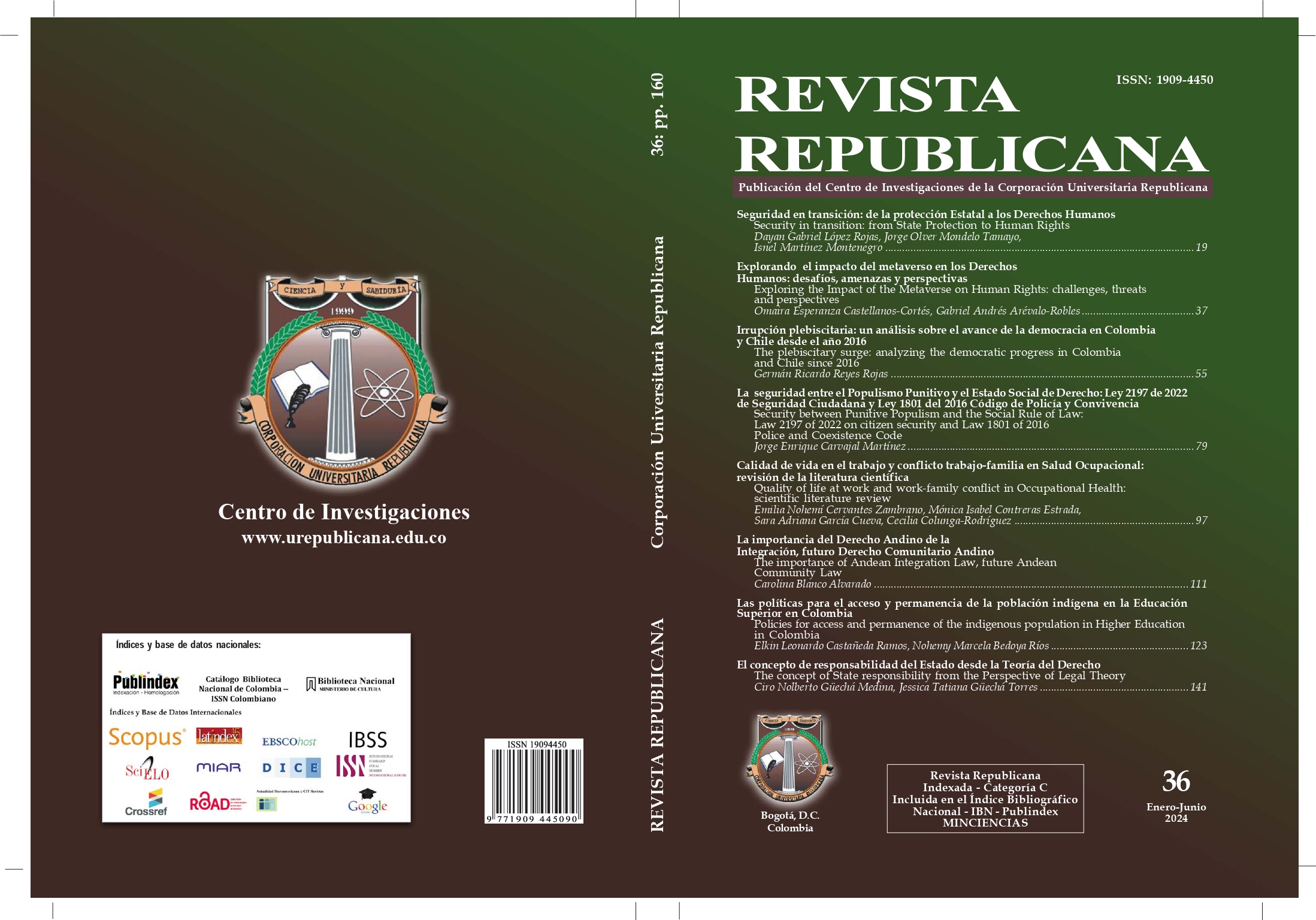The plebiscitary surge: Analyzing the democratic progress in Colombia and Chile since 2016
IRRUPCIÓN PLEBISCITARIA: UN ANÁLISIS SOBRE EL AVANCE DE LA DEMOCRACIA EN COLOMBIA Y CHILE DESDE EL AÑO 2016
Show authors biography
This paper offers a philosophical and legal reflection on political trust in the elections of Chile and Colombia between 2016 and 2023. The analysis is based on Daniel Innerarity’s theory of complex democracy, which argues that preestablished rules of the game must be guaranteed for the electoral process, rooted in liberal democracy. Within this framework, the lack of confidence in elections poses a challenge to defining this system of governance and, specifically, to decision-makers. The lack of trust in elections represents a significant problem for this system of government, particularly for decisión makers. Thus, this document addresses the question of whether plebiscitary indications can be identified in the region, specifically in Chile and Colombia, from 2016 to 2023. And if identified, it aims to analyze what responses have decisión makers in these countries provided during this period. The bibliographic review and qualitative analysis indicate that governments tend to incorpórate more traditional elements of democracy, such as incorporating plebiscites elements into their programs, even if this implies surpassing liberal principles. Additionally, the political trust data seem to challenge the understanding of Latin American electoral rules, but they also present new scenarios that political actors and the government system must address.
Article visits 474 | PDF visits 297
Downloads
- Basset, Y. (2018). Claves del rechazo del plebiscito para la paz en Colombia. Estudios Políticos (Universidad de Antioquia), 52, pp. 241-265. https://revistas.udea.edu.co/index.php/estudiospoliticos/article/view/328879/20787575
- Bordoni, C., & Zygmunt B. (2016). Estado de crisis. Paidós.
- Canetti, E. (2013). Masa y poder. Alianza.
- De la Calle, H. (2008). Reforma electoral en Colombia, en Zovatto, Daniel y Jesús Orozco (Eds.), Reforma política y electoral en América Latina 1978-2007, Ciudad de México: Universidad Nacional Autónoma de México, pp. 391-456. https://www.idea.int/sites/default/files/publications/reforma-politica-y-electoral-en-america-latina-1978-2007.pdf
- Fukuyama, F. (2022). El liberalismo y sus desencantados: Cómo defender y salvaguardar nuestras democracias liberales. Deusto.
- Ginzburg, C. (1999). El queso y los gusanos: El cosmos, según un molinero del siglo XVI. Muchnik Editores.
- Gobierno de Colombia. (2023). Colombia, potencia mundial de la vida. Bases del Plan Nacional de Desarrollo 2022-2026. Departamento Nacional de Planeación. https://colaboracion.dnp.gov.co/CDT/portalDNP/PND-2023/2023-05-04-bases-plan-nacional-de-inversiones-2022-2026.pdf
- Gobierno de Chile. (2022). Plan de Gobierno. Apruebo Dignidad. https://observatorioplanificacion.cepal.org/sites/default/files/plan/files/Plan%2Bde%2Bgobierno%2BAD%2B2022-2026%2B%282%29.pdf
- González, M. (2017). La ‘posverdad’ en el plebiscito por la paz en Colombia, Nueva Sociedad, 269. https://nuso.org/articulo/la-posverdad-en-el-plebiscito-por-la-paz-en-colombia/
- Han, B. (2022). Infocracia. Taurus.
- Innerarity, D. (2020). Una teoría de la democracia compleja: gobernar en el siglo XXI. Galaxia Gutemberg.
- Innerarity, D. (2022). La sociedad del desconocimiento. Galaxia Gutenberg.
- Latinobarómetro. (2023). Informe 2023: La Recesión Democrática De América Latina. Lapop.
- Plata, J., Montalvo, D., Rodríguez, J., & García, M. (2021). Cultura política de la democracia en Colombia y en las Américas 2021: Tomándole el pulso a la democracia. Lapop. https://www.vanderbilt.edu/lapop/colombia/ABCOL2021-Country-Report-Spanish-Final-220408.pdf
- Przeworski, A. (2019). ¿Por qué tomarse la molestia de hacer las elecciones? Pequeño manual para entender el funcionamiento de la democracia. Siglo XXI Editores.
- Román, C. (4 de septiembre de 2022). “La Convención ha fracasado”: Los lamentos, críticas y autocríticas de los ex constituyentes ante el resultado, Emol. https://www.emol.com/noticias/Nacional/2022/09/04/1071913/autocritica-criticas-convencionales-triunfo-rechazo.html
- Runciman, D. (2019). Así termina la democracia. Paidós.
- Sánchez, L. (2021). El hacktivismo: una redefinición de la acción política. Universidad Externado de Colombia.
- Sen, A. (2000). Desarrollo y libertad. Planeta.
- Serrafero, M. (2018). Max Weber y la democracia plebiscitaria. Revista Internacional de Sociología, 76(2), e090. https://revintsociologia.revistas.csic.es/index.php/revintsociologia/article/view/836/1049
- Welp, Y. (2022). The will of the people: populism and citizen participation in Latin America (Democracy in times of upheaval). De Gruyter.
- Welp, Y., & Serdült, U. (2009). Armas de doble filo: La participación ciudadana en la encrucijada. Buenos Aires: Prometeo Libros.


